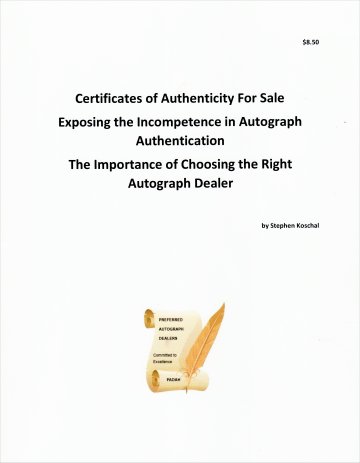|
Matters of Signature Authenticationby Craig Stark 28 May 2019 |
A Review of Stephen Koschal's Certificates of Authenticity for Sale
By Craig Stark
The topic of signature authentication comes up perennially, and two questions in particular repeat themselves:
1. How do I know if my signature is genuine?
2. Do I need a Certificate of Authenticity?
Though we have covered this ground more than once at BookThink, I think it's a good idea to answer these questions again, at least briefly, in order to provide a context for
reviewing autograph dealer Stephen Koschal's recent book, Certificates of Authenticity for Sale, Exposing the Incompetence in Autography Authentication, the Importance of Choosing the
Right Autograph Dealer.
The answer to the first question is, ultimately, you never really know if what you have is authentic. Too many plausible things over the years have been exposed to be forgeries, and
some of these are frighteningly competent - some so competent that their perpetrators have become collectible in their own right. And, what's worse, many forgeries likely persist in the
marketplace, either undetected, or forgotten to be forgeries and recycled or re-fed through the system with spanking new COA that contradicts what had been established earlier. But the
question needs to be asked anyway if for no other reason than a dealer can provide at least some assurance of authenticity, hopefully enough to persuade a collector to pull the
trigger. It isn't the purpose of this article to explain how to go about this, but obviously comparing "known" exemplars to the signature in question and investigating provenance, if
ny exists, should be high on any dealer's to-do list, that is, the dealer should be satisfied first before offering anything asserted to be genuine.
The answer to the second question isn't a slam dunk either. There are collectors who insist on getting a COA with anything and everything they buy. The trouble with this is that many
dealers who issue them aren't themselves especially qualified to evaluate handwriting, and mistakes are made. Sometimes even so-called experts make mistakes - or, more cynically, commit
fraud. Pawn Stars own Steve Grad, the dude with the tablet and magnifier who has authenticated who knows how many items on the show, has at best a questionable past, doubly troubling
because he is PSA's principle authenticator, and everybody trusts PSA, right? Right? If you have a few minutes to blow, take a look here.
The takeaway lesson is not to put blind faith in anybody - and this is the basic lesson in Stephen Koschal's book. What I like about Steve's books are their specific focus, and in
this one he zeroes in on Angelina Joli, offering numerous examples of signed eBay items presented as authentic when they are obviously not, including forgeries, secretarial's, autopen
signatures and more, many of them with "comforting" COA's from so-called legitimate authenticating services. You may ask, is eBay a reliable venue for purchasing autographed items?
The short answer is no, of course not, which isn't to say that genuine things can't be had if one follows a common-sense protocol. More about this some other time.
Meanwhile, know that there is so, so much questionable material circulating in the general marketplace that it could - and often does - paralyze buyers from purchasing anything. What
are we to do? Steve's answer to this is to maintain a list, updated monthly, of "Preferred Autograph Dealers." Or PADAH. His criteria for inclusion: "Each and every dealer on this list
has been hand selected, is totally professional, has many years of experience and will treat you the way you want to be treated." As of February, 2019, there are 58 dealers on the
list, which, by the way, appears toward the end of his book and may also be accessed
here.
Along with this list and the numerous eBay examples is much food for thought here that can help protect you in transactions involving collectible autographs. Unfortunately, we now live
in an environment that assaults us from every direction with highly questionable and/or manipulative crap, fraudulent activity and outright scams. If you're not continuously vigilant, it's
only a matter of time before you'll get dinged. My favorite is an Empire Today TV commercial offering free flooring for additional rooms for only $50 each. Well, read the fine print at
the bottom of the screen and you'll see this: "This offer does not include materials or installation." Anyway, Steve maintains an exceptionally informative resource
here., and go here for a list of his additional publications.

Questions or comments?
Contact the editor, Craig Stark
editor@bookthink.com
















